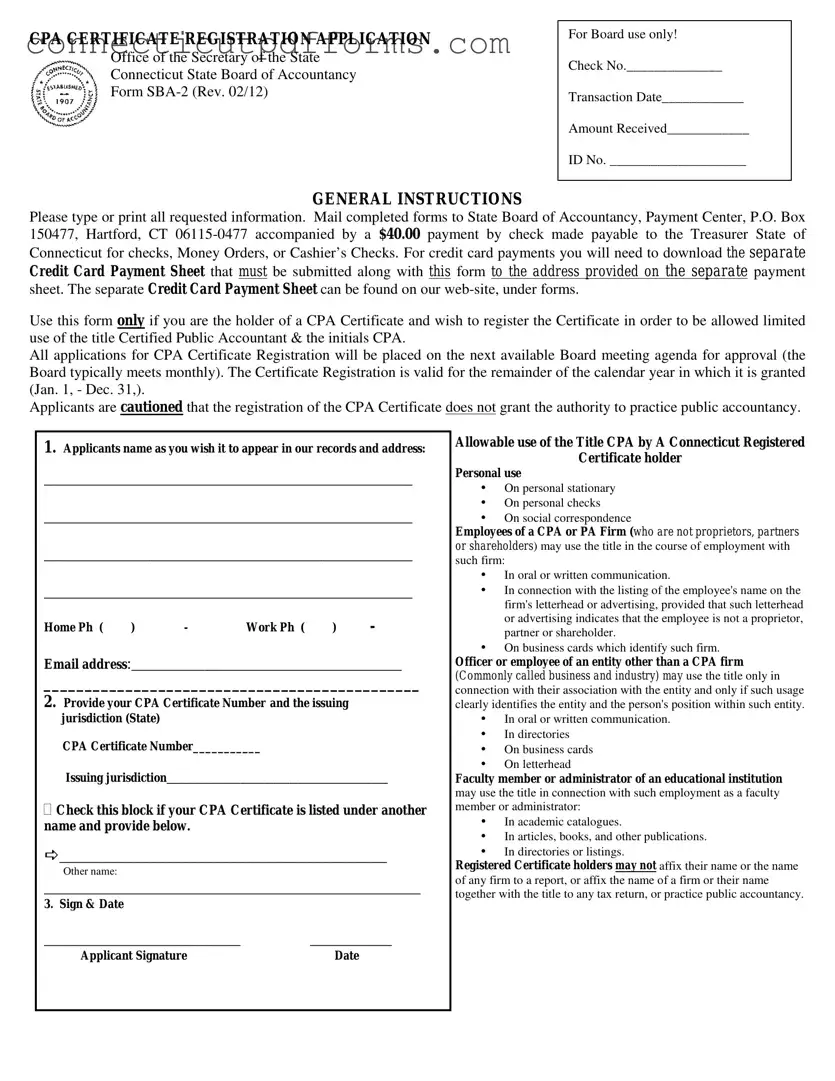CPA CERTIFICATE REGISTRATION APPLICATION
Office of the Secretary of the State
Connecticut State Board of Accountancy
Form SBA-2 (Rev. 02/12)
For Board use only!
Check No.______________
Transaction Date____________
Amount Received____________
ID No. ____________________
GENERAL INSTRUCTIONS
Please type or print all requested information. Mail completed forms to State Board of Accountancy, Payment Center, P.O. Box 150477, Hartford, CT 06115-0477 accompanied by a $40.00 payment by check made payable to the Treasurer State of Connecticut for checks, Money Orders, or Cashier’s Checks. For credit card payments you will need to download the separate Credit Card Payment Sheet that must be submitted along with this form to the address provided on the separate payment sheet. The separate Credit Card Payment Sheet can be found on our web-site, under forms.
Use this form only if you are the holder of a CPA Certificate and wish to register the Certificate in order to be allowed limited use of the title Certified Public Accountant & the initials CPA.
All applications for CPA Certificate Registration will be placed on the next available Board meeting agenda for approval (the Board typically meets monthly). The Certificate Registration is valid for the remainder of the calendar year in which it is granted (Jan. 1, - Dec. 31,).
Applicants are cautioned that the registration of the CPA Certificate does not grant the authority to practice public accountancy.
1.Applicants name as you wish it to appear in our records and address:
_____________________________________________
_____________________________________________
_____________________________________________
_____________________________________________
Home Ph ( ) -Work Ph ( ) -
Email address:_________________________________
______________________________________________
2.Provide your CPA Certificate Number and the issuing jurisdiction (State)
CPA Certificate Number___________
Issuing jurisdiction___________________________
Check this block if your CPA Certificate is listed under another name and provide below.
________________________________________
Other name:
______________________________________________
3. Sign & Date
________________________ |
__________ |
Applicant Signature |
Date |
Allowable use of the Title CPA by A Connecticut Registered
Certificate holder
Personal use
•On personal stationary
•On personal checks
•On social correspondence
Employees of a CPA or PA Firm (who are not proprietors, partners or shareholders) may use the title in the course of employment with such firm:
•In oral or written communication.
•In connection with the listing of the employee's name on the firm's letterhead or advertising, provided that such letterhead or advertising indicates that the employee is not a proprietor, partner or shareholder.
•On business cards which identify such firm.
Officer or employee of an entity other than a CPA firm
(Commonly called business and industry) may use the title only in connection with their association with the entity and only if such usage clearly identifies the entity and the person's position within such entity.
•In oral or written communication.
•In directories
•On business cards
•On letterhead
Faculty member or administrator of an educational institution may use the title in connection with such employment as a faculty member or administrator:
•In academic catalogues.
•In articles, books, and other publications.
•In directories or listings.
Registered Certificate holders may not affix their name or the name of any firm to a report, or affix the name of a firm or their name together with the title to any tax return, or practice public accountancy.
Section 20-280-20 of the Connecticut State Board of Accountancy Regulations
Use of the title "Certified Public Accountant" upon registration of a certificate
(a)Definitions. As used in this section:
(1)"Certificate" means a Connecticut, "certified" public accountant" certificate issued either prior to October 1, 1992, or pursuant to section 20-281c of the general statutes;
(2)"Firm" means any person, proprietorship, partnership, corporation or association and any other legal entity that practices public accountancy;
(3)"License" means a public accountancy license issued pursuant to section 20-182b or 20-281d of the general statutes;
(4)"Licensee" means the holder of a certificate issued pursuant to section 20-281c, the holder of a license issued pursuant to section 20-281b or 20-281d or a holder of a permit to practice public accountancy issued pursuant to sections 20- 281b and 20-281e;
(5)"Permit,” means a permit to practice public accountancy issued to a firm pursuant to section 20-281e of the general statutes;
(6)"Practicing public accountancy" means performing for the public or offering to perform for the public for a fee by a person or firm holding himself or itself out to the public as a licensee one or more kinds of services involving the use of accounting or auditing skills, including, but not limited to, the issuance of reports on financial statements, or of one or more kinds of management advisory, financial advisory or consulting services, or the preparation of tax returns of the furnishing of advice on tax matters;
(7)"Registration" or "Registered" means, when used in the context of a certificate, registration pursuant to subsection (f) of section 20-281c of the general statutes;
(8)"Report" means any writing which refers to a financial statement and (A) expresses or implies assurance as to the reliability of said financial statement, and includes, but is not limited to, any writing disclaiming an opinion, when such writing contains language conventionally understood in the profession to express or imply assurance as to the reliability of such financial statement, and (B) expresses or implies that the person or firm issuing such writing has special competence in accounting or auditing, which expression or implication arises from, among other things, the use of written language which is conventionally understood in the profession to express or imply assurance as to the reliability of financial statements.
(9)"Title pertaining to certification" or "Title pertaining to such certification" means the title or designation "certified public accountant" or the abbreviation "CPA" or any other title, designation, words, letters, abbreviations, sign, card or device tending to indicate that a person is a certified public accountant.
(b)The holder of a certificate who does not also hold a license shall not use the title pertaining to such certification except as permitted by this section of the regulations of the Connecticut state agencies.
(c)In addition to the use permitted by subsection (g) of this section, the holder of a registered certificate who is an employee of a firm which holds a current permit to practice public accountancy but who is not a proprietor, partner or shareholder of such firm, may use the title pertaining to such certification, only in the course of his employment with such firm, in oral or written communication, in connection with the listing of such employee's name on the firm's letterhead an in advertising for the firm, provided that such letterhead or advertising indicates that such employee is not a proprietor, partner or shareholder in such firm, and in connection with the listing of such employee's name on business cards which identify such firm.
(d)In addition to the use permitted by subsection (g) of this section, the holder of a registered certificate actively employed as a faculty member or administrator of an educational institution, whether public or private, for profit or nonprofit, may use the title pertaining to such certification only in connection with such employment as a faculty member or administrator, including ,but not limited to, use in academic catalogues, articles, books and other publication and in academic directories or listings.
(e)In addition to the use permitted by subsection (g) of this section, the holder of a registered certificate who is an officer or employee of an entity other than a firm engaged in the practice of public accountancy may use the title pertaining to such certification only in connection with his association with such entity and only if such usage clearly identifies the entity and the person's position within such entity, and may include use on correspondence, business cards, directories, and oral or written communication.
(f) . Nothing in this section shall be construed to allow the holder of a certificate, who does not also hold a license, to affix his name or the name of any firm to a report, or to affix the name of a firm or his name together with the title pertaining to such certification to any tax return, or to allow the holder of a certificate, who does not also hold a license and a permit, to practice public accountancy
(g)The holder of a certificate may use the title pertaining to such certification on personal stationary, checks and social correspondence, provided that, except as provided in subsections (c), (d) and (e) of this section, such title shall not be used in connection with any activity engaged in for the purpose of generating income or which does generate income.


